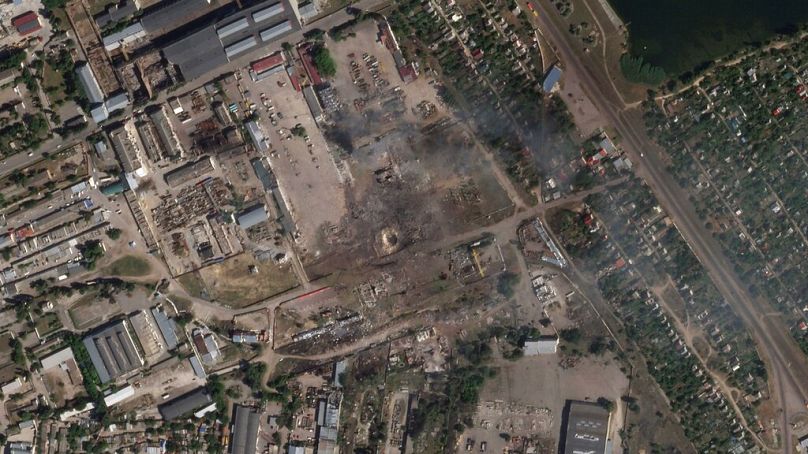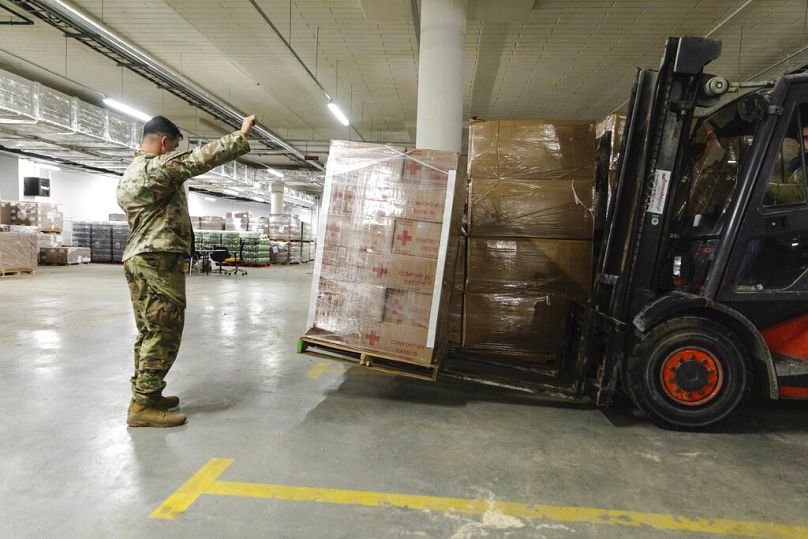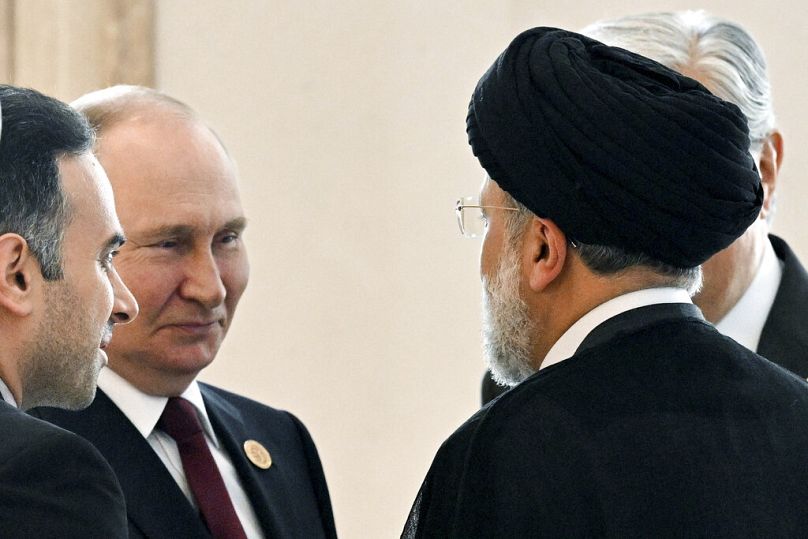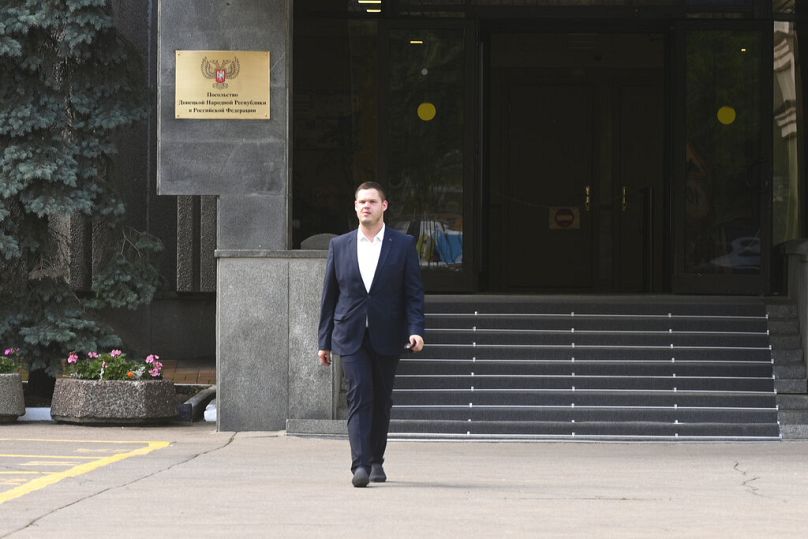Ukraine strikes Russian ammunitions depot, US and EU approve more funding for Kyiv, separatists open Moscow 'embassy'.
1. Ukraine braces for renewed Russian assault
Ukraine expects a fresh assault by Russian ground forces, following widespread shelling which killed more than 30 people, as Kyiv's Western allies brace for a worsening of the global energy crisis if Russia cuts its supply of oil and gas.
Although the Kremlin has announced a pause in its assault after claiming victory in the eastern Luhansk region following the fall of Lysychansk, Russia's bombardment has continued throughout Ukraine.
Ukraine's general staff said the shelling across the country amounted to preparations for an intensification of hostilities as Russia seeks to seize the rest of the Donetsk region and control the entirety of the eastern Donbas industrial heartland.
Ukrainian President Volodymyr Zelenskyy said Russia had carried out 34 air strikes since Saturday, one of which hit a five-storey apartment building killing 31 people and trapping dozens.
Many Ukrainian cities, towns and villages have been left in ruins and the human cost of Russia's invasion, Europe's biggest conflict since World War II and now in its fifth month, mounts.
2. Ukraine reports strike on Russian ammunition depot in the south
Ukrainian authorities said Tuesday that their forces targeted a Russian ammunition depot in southern Ukraine overnight, resulting in a massive explosion captured on social media.
The Ukrainian military’s southern command said a rocket strike targeted the depot in Russian-held Nova Kakhovka, about 35 miles (55 kilometers) east of the Black Sea port city of Kherson, which is also occupied by Russian forces.
The precision of the strike suggested Ukrainian forces used U.S-supplied multiple-launch High Mobility Artillery Rocket Systems, or HIMARS, to hit the area. Ukraine indicated in recent days that it might launch a counteroffensive to reclaim territory in the country’s south as Russia devotes resources to capturing all of the eastern Donbas region.
Russia’s Tass news agency offered a different account of the blast in Nova Kakhovka, saying a mineral fertilizer storage facility exploded, and that a market, hospital and houses were damaged in the strike. Some of the ingredients in fertilizer can be used for ammunition.
A satellite photo taken Tuesday and analyzed by The Associated Press showed significant damage. A massive crater stood precisely where a large warehouse-like structure once stood in the city,
Ukraine now has eight of the HIMAR systems, a truck-mounted missile launcher with high accuracy, and Washington has promised to send another four.
3. EU and US approve more funds for Ukraine
Ukraine is getting an additional $1.7 billion (€1.7 billion) extra assistance from the US government and the World Bank to pay the salaries of its beleaguered healthcare workers and provide other essential services.
The money coming Tuesday from the US Agency for International Development, the Treasury Department and the World Bank is meant to alleviate the acute budget deficit caused by Russian President Vladimir Putin’s “brutal war of aggression,” USAID said in a statement.
While many medical staffers have left Ukraine, some hospitals have shut down and other hospitals have been bombed. The health workers who remain in Ukraine do their jobs in dire conditions.
Viktor Liashko, Ukraine’s minister of health, said paying health workers' salaries is becoming more difficult each month “due to the overwhelming burden of war."
“$1.7 billion is not just yet another financial support; it is an investment that makes us a step closer to victory," Liashko said in a statement.
Also on Tuesday European ministers approved a Commission proposal to provide an additional €1 billion in assistance to Ukraine.
The new macro-financial assistance (MFA) adds to the €1.2 billion already given earlier this year and will be issued as a long-term loan.
It is intended to address the immediate and most urgent funding needs of Ukraine and to ensure the Ukrainian state can continue to perform its most critical functions.
4. Putin to visit Tehran amid Iranian drone acquisition allegations
President Vladimir Putin is to visit Iran next week, just one day after the United States accused Iran of sending weapons-capable drones to Russia.
Kremlin spokesman Dmitry Peskov announced on Tuesday that Putin will travel to Tehran next Tuesday 19 July, to take part in a tripartite meeting with his Iranian and Turkish counterparts as part of the Astana peace process to end the war in Syria.
Putin intends to leave for Tehran right after the end of US President Joe Biden’s visit to Israel and Saudi Arabia to discuss Iran’s nuclear programme and malign activities in the region.
According to Mohammadreza Pourabrahimi, Chairman of the Economic Commission of the Iranian Parliament, the government in Tehran hopes that Putin’s visit will provide the basis for the expansion of bilateral economic cooperation between Iran and Russia in a situation where both countries are under US sanctions.
Peskov also confirmed that Putin will have a separate meeting with Turkish President Recep Tayyip Erdoğan while in Tehran.
The White House said on Monday that it believes that Russia is turning to Iran to provide it with “hundreds” of drones, including those capable of carrying weapons, for use in Ukraine.
5. Separatists open Moscow 'embassy'
The separatist region of Donetsk, in eastern Ukraine, opened an "embassy" in Moscow on Tuesday, while denouncing a worsening situation on the ground, where fighting is intense.
"The situation has worsened drastically in recent days," said Natalia Nikanorova, the foreign minister of the pro-Russian separatist region.
"We are in no hurry," Nikanorova said when asked about the region's intention to fully rejoin Russia.
"The main goal is to liberate the republic," she said, using the language used by Russia to describe the territorial conquest of the region.
"Then there will be a referendum in due course and we will see what the will of the people is," she said, adding that she was "ready" to change the status of the "embassy" in such an event.
Russian President Vladimir Putin recognised the independence of the two regions of Lugansk and Donetsk, which form the Donbass basin, from Kiev in February, paving the way for Russian troops to enter Ukraine a few days later, on 24 February.
Moscow is currently focusing its military offensive in eastern Ukraine.
Nikanorova was accompanied by the "ambassador" of the separatist Donetsk region, Olga Makeyeva.
The two women spoke to the press in the courtyard of the grey building where the "embassy" will be located, in a central district of the Russian capital, with a heavy police presence. The inauguration took place in the absence of high-ranking Russian officials.















